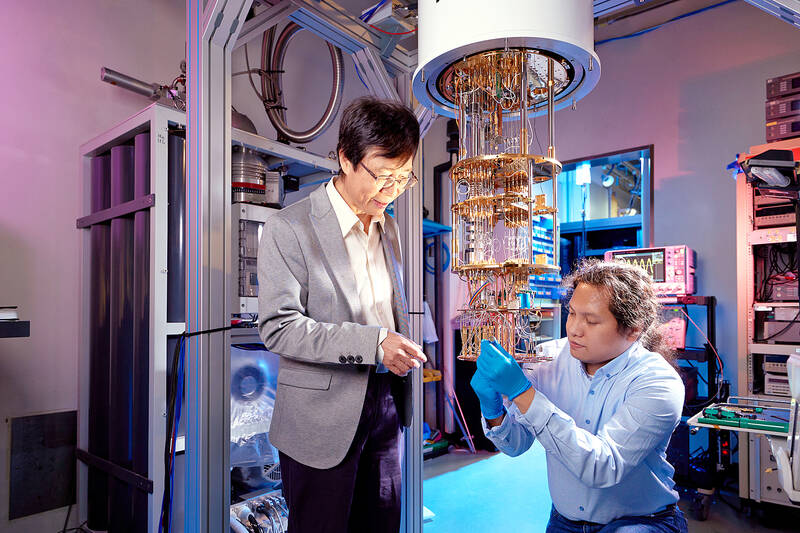Academia Sinica yesterday unveiled a quantum computer based on 5-quantum-bit (qubit) chips, connecting the device to the Internet to enable its use in scientific research by the institution’s members and partners.
The computer’s launch marked another milestone in the nation’s research into and development of quantum computing following the chip’s creation in October last year, said Chen Chii-dong (陳啟東), a research fellow at Academia Sinica’s Research Center of Applied Sciences.
Researchers participating in the Ministry of Science and Technology’s project accomplished the objectives ahead of the ministry’s schedule, which had stipulated the development of 3-qubit chips by February last year, he said.

Photo courtesy of Academia Sinica
The Taiwanese quantum computer’s logic gate reached a 99.9 percent fidelity rate, he added.
Although great strides have been and are being made in quantum computing technology, there is still a long way to go for its practical application in the commercial sector or for personal use, Academia Sinica said.
The 5-qubit computer is now available for use as a test and development platform for quantum computing, ultra-low temperature complementary metal oxide semiconductor (CMOS) and operational amplifier research programs, it said.
The Taiwanese research team has consistently outperformed expectations despite being given less time and resources than the quantum computer research programs of foreign nations, Academia Sinica President James Liao (廖俊智) said.
The program’s successful achievements are a basic part of the technology, and researchers need time to resolve foundational problems before breaking through the next bottleneck, he said.
Academia Sinica’s work in quantum computing is intended to blaze a trail for the nation’s private sector and generate the momentum necessary to sustain the investment in talent and education, Liao said.
Taiwan’s quantum computing project is a collaboration between Academia Sinica, the Industrial Technology Research Institute, National Changhua Normal University, National Central University, National Chung Hsin University, the University of California, Santa Barbara and the University of Wisconsin-Madison, it said.

CRITICAL MOVE: TSMC’s plan to invest another US$100 billion in US chipmaking would boost Taiwan’s competitive edge in the global market, the premier said The government would ensure that the most advanced chipmaking technology stays in Taiwan while assisting Taiwan Semiconductor Manufacturing Co (TSMC, 台積電) in investing overseas, the Presidential Office said yesterday. The statement follows a joint announcement by the world’s largest contract chipmaker and US President Donald Trump on Monday that TSMC would invest an additional US$100 billion over the next four years to expand its semiconductor manufacturing operations in the US, which would include construction of three new chip fabrication plants, two advanced packaging facilities, and a research and development center. The government knew about the deal in advance and would assist, Presidential

‘DANGEROUS GAME’: Legislative Yuan budget cuts have already become a point of discussion for Democrats and Republicans in Washington, Elbridge Colby said Taiwan’s fall to China “would be a disaster for American interests” and Taipei must raise defense spending to deter Beijing, US President Donald Trump’s pick to lead Pentagon policy, Elbridge Colby, said on Tuesday during his US Senate confirmation hearing. The nominee for US undersecretary of defense for policy told the Armed Services Committee that Washington needs to motivate Taiwan to avoid a conflict with China and that he is “profoundly disturbed” about its perceived reluctance to raise defense spending closer to 10 percent of GDP. Colby, a China hawk who also served in the Pentagon in Trump’s first team,

SEPARATE: The MAC rebutted Beijing’s claim that Taiwan is China’s province, asserting that UN Resolution 2758 neither mentions Taiwan nor grants the PRC authority over it The “status quo” of democratic Taiwan and autocratic China not belonging to each other has long been recognized by the international community, the Mainland Affairs Council (MAC) said yesterday in its rebuttal of Beijing’s claim that Taiwan can only be represented in the UN as “Taiwan, Province of China.” Chinese Minister of Foreign Affairs Wang Yi (王毅) yesterday at a news conference of the third session at the 14th National People’s Congress said that Taiwan can only be referred to as “Taiwan, Province of China” at the UN. Taiwan is an inseparable part of Chinese territory, which is not only history but

INVESTMENT WATCH: The US activity would not affect the firm’s investment in Taiwan, where 11 production lines would likely be completed this year, C.C. Wei said Investments by Taiwan Semiconductor Manufacturing Co (TSMC, 台積電) in the US should not be a cause for concern, but rather seen as the moment that the company and Taiwan stepped into the global spotlight, President William Lai (賴清德) told a news conference at the Presidential Office in Taipei yesterday alongside TSMC chairman and chief executive officer C.C. Wei (魏哲家). Wei and US President Donald Trump in Washington on Monday announced plans to invest US$100 billion in the US to build three advanced foundries, two packaging plants, and a research and development center, after Trump threatened to slap tariffs on chips made